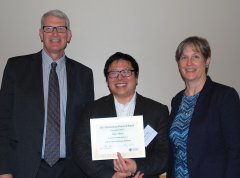News & Announcements
Scott Garman and other Public Engagement Fellows Share Research with Legislators and Policymakers
Scott Garman and other Public Engagement Fellows Share Research with Legislators and Policymakers
Scott Garman was one of five Public Engagement Project fellows to visit the State House May 9 to share research and explore synergies with state representatives, senators and other policy leaders. Read more
Sandra Petersen awarded NIEHS grant to study little-known gene linked to development, disease and disorders
Sandra Petersen awarded NIEHS grant to study little-known gene linked to development, disease and disorders
Sandra Petersen recently received a two-year, $438,000 exploratory grant from the National Institute of Environmental Health Sciences to further her studies of a little-known gene, CUG RNA-binding protein 2 (CUGBP2), which affects sex-specific development processes in the brain and has been linked to Alzheimer’s disease, neural cell death and reproductive disorders. Read more
Peter Chien receives CNS Oustanding Research Award
Peter Chien receives CNS Oustanding Research Award
Congratulations to Peter Chien, recipient of the CNS Outstanding Research Award (early career)! Peter's research focuses on protein degradation and unfolding, and protein quality control. He received the award recognizing his research accomplishments at a reception on April 27. Read more
Becoming Weeds
Becoming Weeds
Ana Caicedo is an author on a new paper about a new resequencing analysis of weedy rice (Oryza sativa L.) biotypes illuminates distinct evolutionary paths and outcomes of de-domestication and ferality. This largest effort to date in weedy plant genomics gives a better understanding of weediness while also providing a promising source of alleles for rice breeding. Read More
Monifa Fahie PhD Dissertation Defense
Monifa Fahie PhD Dissertation Defense
Monday, May 8, 2017
9:00 AM
Life Sciences Laboratories Building, Room N410
Dissertation title: Pore forming protein assembly and the use in nanopore sensing: a study on E. coli proteins ClyA and OmpG
Advisor: Min Chen
Three MCB students awarded Graduate School Dissertation Research Grants
Three MCB students awarded Graduate School Dissertation Research Grants
Three MCB students, Kamal Joshi (Chien group), Alexandria Wells (Pobezinsky group) and Trisha Zintel (Babbitt group), received Dissertation Research Grants from the Graduate School. This program recognizes the research and accomplishments of the outstanding graduate students at UMass, and provides funds to assist recipients in completion of their dissertation.
Between the folds with the small and mighty: Ligands guiding the folding of proteins in surprising ways
Between the folds with the small and mighty: Ligands guiding the folding of proteins in surprising ways
MCB students in the Gierasch and Garman labs at UMass, Amherst, have advanced the understanding of the relationship between protein folding and ligands, very small (~100 daltons in size) molecules which reside in the cell. Ligands were found to guide much larger molecules in the folding process, by recent MCB Alumnus, Karan Hingorani. Misfolded proteins are often the cause of disease, and the findings, by Hingorani, and confirmed by current MCB Program students, Mathew Metcalf and Derrick Deming have important implications in new therapies and pharmacological treatments of disease. Read more
Karthik Chandiran PhD Dissertation Defense
Karthik Chandiran PhD Dissertation Defense
Wednesday, March 29, 2017
2:30 PM
Integrated Sciences Building, Room 221
Dissertation Title: Notch1 modification and signaling in T helper cell differentiation
Advisor: Lisa Minter
Pilotte receives Bill and Melinda Gates Foundation Grand Challenges Explorations Phase II Award
Pilotte receives Bill and Melinda Gates Foundation Grand Challenges Explorations Phase II Award
Nils Pilotte, a 4th year student in the University of Massachusetts Amherst Molecular and Cellular Biology Ph.D. Program, recently received a Bill and Melinda Gates Foundation Grand Challenges Explorations Phase II Award in the amount of $424,874. This award, which was received as a follow-up to a 2013 Phase I award in the amount of $100,000, will expand upon his preliminary proof-of-concept research, and aims to enable low-cost, high-throughput, sustainable surveillance for the presence of tropical parasites through the molecular monitoring of hematophagic insect excreta/feces (E/F). Through the sampling and analysis of E/F rather than whole insects, the biological mass of samples can be greatly reduced, minimizing the limitations imposed by the presence of large concentrations of “polluting” DNA, and allowing for the improved throughput of testing. Furthermore, as non-vector insects which have taken a parasite-containing blood meal rid themselves of parasite material through deposition in the E/F, such testing expands the pool of material suitable for analysis. Preliminary work has demonstrated the adaptability of this methodology to the detection of both filarial and malarial parasites, and Nils will work to fine tune these testing platforms with the goal of developing recommendations for the programmatic implementation of this alternative approach to infection monitoring and surveillance.
Kamal Kishore Joshi PhD Dissertation Defense
Kamal Kishore Joshi PhD Dissertation Defense
2:00 PM
Monday, January 30, 2017
Life Sciences Laboratories Building, Room S330
Dissertation Title: ADAPTORS AT WORK: REGULATION OF BACTERIAL PROTEOLYSIS BY ADAPTOR HIERARCHIES
PI: Peter Chien







